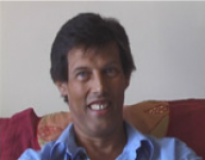Interview HF30

Age at interview: 47
Age at diagnosis: 41
Brief Outline: 1979 hernia operation, heart damage discovered. 1980 pericardial sac removed. 1996 heart failure diagnosed.
Background: Retired (ill health); married with 2 children.
More about me...
Having heart failure forced him to look for a less physical job.
Having heart failure forced him to look for a less physical job.
SHOW TEXT VERSION
PRINT TRANSCRIPT
And there he was talking to somebody with severe heart failure who was his hardest grafter! And he kind of, I wanted to have a go at him you know because I'm not one for sort of standing back when something needs to be said, and then so when I went for this other interview I had this in mind, don't you dare mention having a heart failure.
So I got the job as an inspector and I went and it was basically an inspector, lovely job, you just looked at something, compared it with a drawing and said yes or no.
The number of heart failure drugs he's taking has reduced over the years.
The number of heart failure drugs he's taking has reduced over the years.
SHOW TEXT VERSION
PRINT TRANSCRIPT
Describes his response to finding his heart was not strong enough for a heart transplant.
Describes his response to finding his heart was not strong enough for a heart transplant.
SHOW TEXT VERSION
PRINT TRANSCRIPT
This is the problem with the system up there, they're not very precise in exactly what they say to you. They're not very good at communicating. It was one of the worst places I ever went for communications. And at the time I was taking warfarin, that would cause a problem, the calcification would cause a problem, there was a number of things that I can't remember now. Because to be honest, when you're sat in that little room and he walks in and he brings a nurse with him, I said to [wife] 'It's no good', cause as soon as I saw the nurse you observe the body language.
So I walked out of the place totally numb, dumbfounded and I think that was the worst thing my wife ever said at the time since we'd been married when we went outside, 'Don't worry, there's people worse off than you'. And I couldn't believe she'd said it. And I understood, I know what she meant because when we were there, there were people 10/12 years of age being pushed around in wheelchairs with the trolley following them with the oxygen. But your illness is relevant, it's your illness, it's your pain, it's your discomfort. You can't put yourself into the place of somebody who might be worse off than you. So although I can sympathise with them I still don't want to be like I am now. I'd like to have had a heart transplant. And I had this discussion with the consultant in as much as 'quality of life', because he once said, 'We'll take a chance and do the operation on you in the 11th hour or when your 'quality of life' is such that you've nothing to lose'.
Gives a negative view of outpatient clinics.
Gives a negative view of outpatient clinics.
SHOW TEXT VERSION
PRINT TRANSCRIPT
And it's like, it seems to me the outpatients job is the job of somebody, 'Well you can do outpatients today.' It's like the give-away job, and so every time I go up there I see my consultant in the end office and I'm just hoping I'm going to get his ticket and I don't. And so in the end I just sort of raise my eyes in the air, and I look at the person I'm with and I just get as awkward as hell. And they don't like it, but then as I said to somebody, they're not the ones who go home afterwards to what I have to go home to.
Yes, it's one of my arguments in the past because often when you go to an outpatients clinic what happens there is you say what's wrong, and each doctor has got each their own idea of what should be. So they give you an idea of what, their idea of what you should be taking, and they'll change it so you go out and you try it. I learned eventually that it didn't make a lot of difference, I went back to what it was before, better the devil you know kind of attitude.
Explains that having to take drugs everyday has affected his quality of life.
Explains that having to take drugs everyday has affected his quality of life.
SHOW TEXT VERSION
PRINT TRANSCRIPT
So you'd be knackered if the only source of food you can have came from the rain-forest because we don't have rain-forests here. So you'd have to go to Brazil or Australia and that's the only snag. I have to go to a chemist and I need a doctor's list, so it reduces my freedom, my quality of life, freedom. And..it is just a split-second thing sometimes, I just see them there, and it's like the enemy instead of my friend, I just smash them - let them know who's the boss, I'm the boss.
Once or twice, this was going back a few years, I didn't take them at all. I actually got away with it for about a day. If I did that now, I'd be struggling after a day, I couldn't do it now, my heart just isn't that strong, it is very, very weak now.

